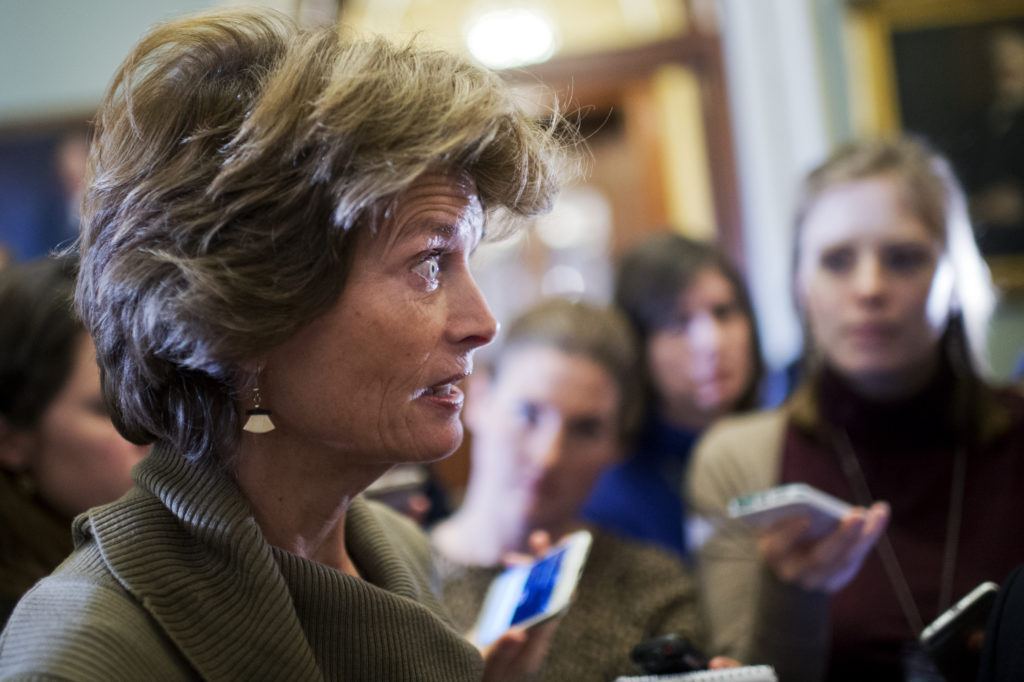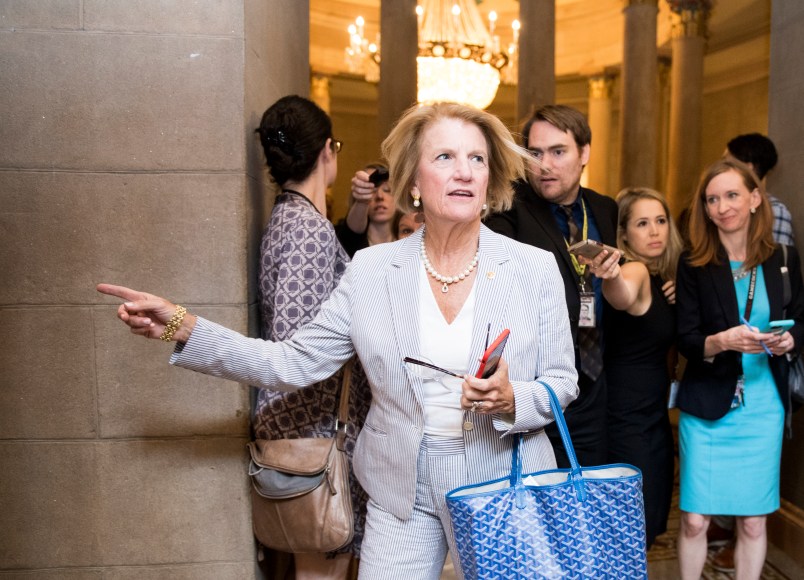Just one week ago, Sen. Shelley Moore Capito (R-WV) came out swinging against the Senate bill to repeal the Affordable Care Act—saying its deep cuts to Medicaid would devastate her low-income constituents, emphasizing that more funding for opioid addiction alone would not be enough to win her over, and vowing to stick her neck out to be the vote that kills the bill if necessary.
“I only see it through the lens of a vulnerable population who needs help, who I care about very deeply,” said Capito, whose state’s uninsured rate would spike more than any other if the bill becomes law. “That gives me strength. If I have to be that one person, I will be it.”
A few days later, a revised bill hit her desk. It included an extra $45 billion dedicated to treating the opioid epidemic that has wracked her state and many others, but the hundreds of billions in Medicaid cuts that so concerned her remained unchanged.
Yet Capito, and a handful of other moderate Republican lawmakers who quite recently cited the Medicaid cuts as a deal-breaker, were oddly tight-lipped last week after the updated bill’s release, and went out of their way to avoid speaking to reporters.
Only two senators—Susan Collins (R-ME) and Rand Paul (R-KY)—came out as firm no’s on the procedural motion to proceed to debate on the bill. If just one more joins them, the effort is dead.
But that third no vote is proving stubbornly elusive—despite the fact that in revising the bill, Senate Majority Leader Mitch McConnell largely moved to appeal to his most right-wing senators, throwing moderates who had promised to protect Medicaid and people with pre-existing conditions under the bus.
The revisions pair more deregulation of the health care marketplace, largely via Sen. Ted Cruz’s controversial amendment, with a rollback of tax breaks for the wealthy and the allocation of more money to stabilize insurance markets and treat opioid addiction. But not only is the bill’s additional money counted multiple times to meet multiple needs, it’s a drop in the bucket compared to the hundreds of billions that will cut over time from Medicaid and tax credits for low-income and older Americans.
This makes things extremely awkward for senators like Dean Heller (R-NV), who just a few weeks ago blasted the legislation and demanded it be amended to either keep Obamacare’s Medicaid expansion intact or increase traditional Medicaid spending.
The new bill does neither—and Heller admitted Thursday that “Fundamentally, they haven’t changed” the legislation—yet he did not come out against it.

And then there’s Sen. Lisa Murkowski (R-AK), who reportedly went off in a closed-door meeting with GOP leadership about the bill’s cuts to Medicaid and pleaded with them to leave the program alone, but would not say publicly how she plans to vote on the bill itself. Murkowksi has previously said she can’t vote for a bill that repeals Alaska’s Medicaid expansion, and can’t vote for a bill that defunds Planned Parenthood. The Senate’s health care bill does both.
Murkowski, however, will be shielded from some of the worst impacts of the Medicaid cuts by a carveout tucked into the bill specifically for her state. Dubbed the “Polar Payout” or “Klondike Kickback,” the provision would give Alaska hundreds of millions of dollars to help lower insurance premiums.
Murkowski has promised before that such a sweetener would not be enough to win her over, saying in June: “Let’s just say that they do something that’s so Alaska-specific just to, quote, ‘get me.’ Then you have a nationwide system that doesn’t work. That then comes crashing down and Alaska’s not able to kind of keep it together on its own.” Whether she stands by this statement and opposes the revised bill remains unclear.
Then there are the senators across the Republican caucus who have vowed to protect pre-existing conditions, who may yet vote for a bill that the insurance industry and outside health care experts have warned would price people with pre-existing conditions out of the market entirely.
With a vote delayed as Sen. John McCain (R-AZ) recovers from surgery, leaving Republicans a vote short, McConnell has a few more days to employ a similar strategy to the one that successfully muscled the bill through the House: please most the hardline conservative and hope the moderates cave.
With nothing in the revisions that address their previous core problems with the legislation, McConnell is forcing these moderates to either kill their party’s eight-year campaign to repeal the Affordable Care Act or betray their recent promises in order to fall in line and vote for the bill.







Party before Country.
The fact that there is so little GOP opposition to this widely-scorned and reviled bill illustrates the deep moral rot at the heart of today’s Putinized Republican Party. The GOP has deeper concern and solicitude for what Russia wants than it does for the majority of the American public.
http://www.politicalresearch.org/2017/05/11/between-trump-and-putin-the-right-wing-international-a-crisis-of-democracy-and-the-future-of-the-european-union/#sthash.REm650rE.dpbs
This will be a defining moment for these people as well. The question is, will they define themselves as strong, caring people or will they define themselves as cowardly self-interested weaklings, unwilling to stand up to McTurtle and Drumpfie.
No need to stage mock die-ins if the bill passes.
One might think that they could just pass a law making it illegal to refer to the Patient Protection and Affordable Care Act as “Obamacare” and have the same effect as passing a law that only about 20% of the American people support. If the ACA wasn’t called “Obamacare”, Republicans wouldn’t object to it.